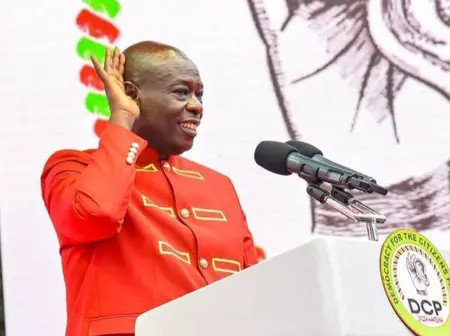Former Deputy President Rigathi Gachagua’s Democracy for Citizens Party (DCP) has enjoyed an astronomical rise to the top table in terms of popular political parties in Kenya, according to a recent poll by Trends and Insights for Africa (TIFA) Research.
Results of the poll released on Wednesday, September 24, showed that DCP came third at 9 percent. For context, Gachagua launched the party in Lavington, Nairobi, on May 15, 2025…just four months ago!
During the launch, Gachagua named former Kakamega Senator Cleophas Malala as the interim Deputy Party Leader, former Agriculture Cabinet Secretary Mithika Linturi as the National Organizing Secretary, former Laikipia Woman Representative Cate Waruguru as the National Women Leader, among other appointments.
The party’s popularity can be attributed, in part, to Gachagua’s rocketing up the political space since he was impeached as Deputy President in October 2024, and his opposition towards President William Ruto as well as his ‘Wantam’ movement, which he pioneered, winning over a fanbase that exceeded anyone’s expectations.
DCP ranking third as a newcomer meant that it upset veteran parties that include Wiper, Jubilee, DAP-Kenya, Ford-Kenya, among others. Ranked above DCP were the ruling United Democratic Alliance (UDA) and Orange Democratic Movement (ODM) parties, respectively.
UDA remained Kenya’s most popular political party at 16 per cent, followed by ODM at 13 per cent. DCP’s 9 per cent popularity means that it poses a threat to the two parties ahead of the 2027 general elections.
“UDA remains the most popular political party, though the level of support expressed for it (16%) is only half that expressed for no political party at all (31%),” part of the report read.
The TIFA survey, however, showed that 31 percent of Kenyans said they do not support any political party — the highest level of non-affiliation recorded since political polling resumed in the country in the late 1990s.
“Combined with those who indicate they are currently ‘undecided’ as to which party they support, four out of ten Kenyans currently express support for no party at all – the highest such figure ever obtained from this question since political polling returned to Kenya in the late 1990s,” added the survey.
When combined with undecided voters, about four in ten Kenyans now say they support no political party — a clear sign of shifting dynamics in the country’s politics, something DCP can take advantage of.
UDA’s popularity has dropped sharply from 38% to 16%, while ODM has fallen from 32% to 13%. Jubilee slipped slightly from 5% to 3%, as Wiper held steady at 4%. Meanwhile, the Democratic Congress Party (DCP) entered the scene with 9% support, and smaller outfits like Ford-Kenya and DAP-Kenya stayed unchanged at 1% each. Support for other parties rose from 4% to 10%.
The biggest shift is in the undecided or non-aligned group, which has surged from 15% to 43%, now forming the single largest bloc.
TIFA says this shows rising disillusionment with established parties, pointing to voter frustration or unwillingness to align with current political options. The survey adds that it remains unclear whether this trend will deepen or shift as the next general election approaches in two years.
However, the by-elections scheduled for late November are expected to offer the first glimpse of where voter sentiment is headed.
“Whether such numbers increase as the country approaches the next elections in two years – and just how they will be distributed across the ‘menu’ of political parties – time will tell, though the various by-elections at the end of November should give some preliminary indication,” the report read.
The second set of findings comes from a TIFA national survey carried out between August 23 and September 3, and published on Wednesday, September 24, 2025.
The survey interviewed 2,023 randomly chosen Kenyan adults, aged 18 and above, in their homes across all 47 counties.

Leave a Reply